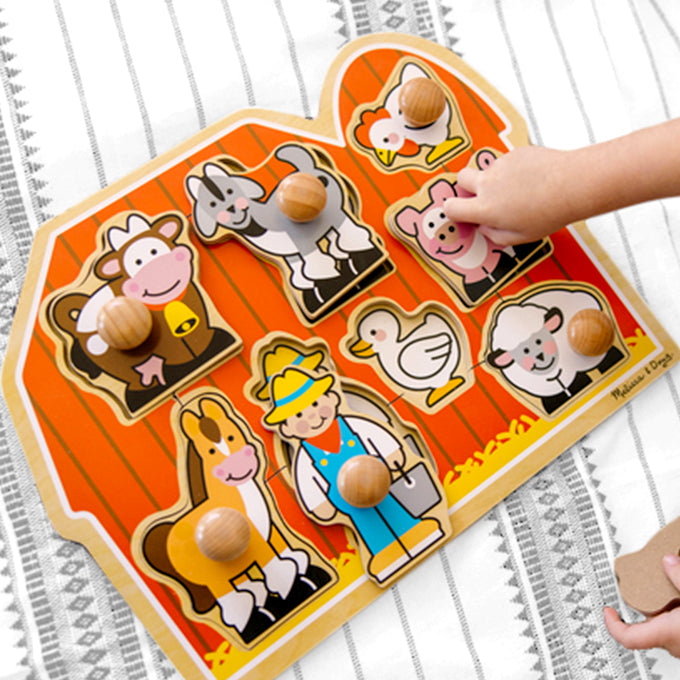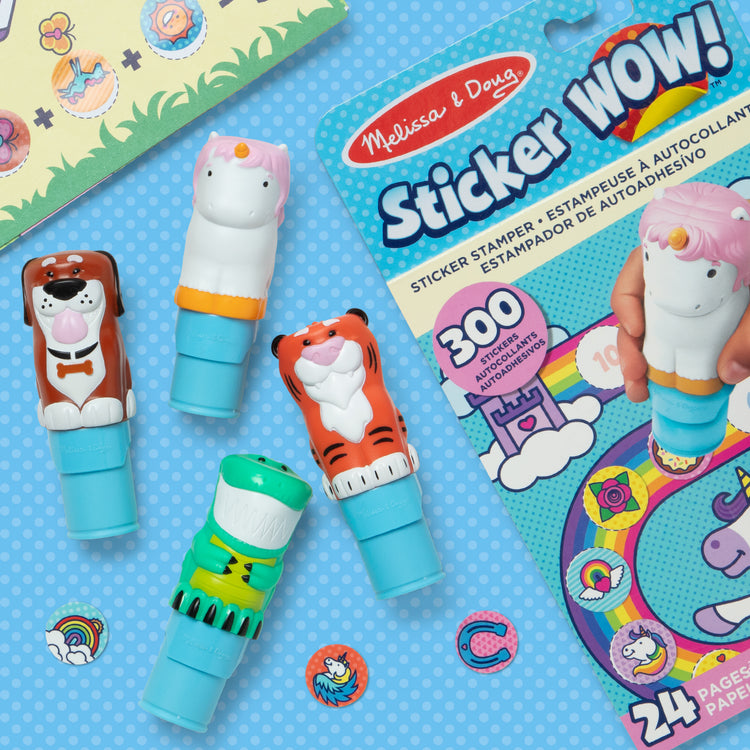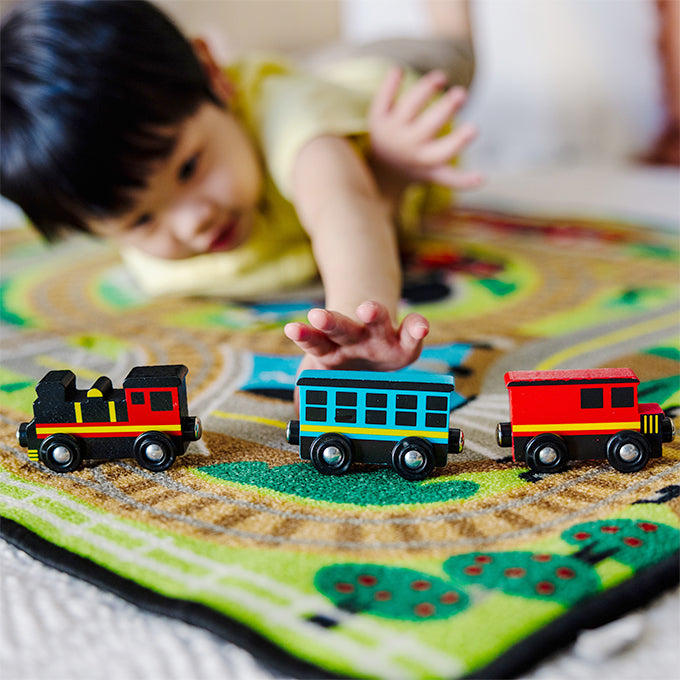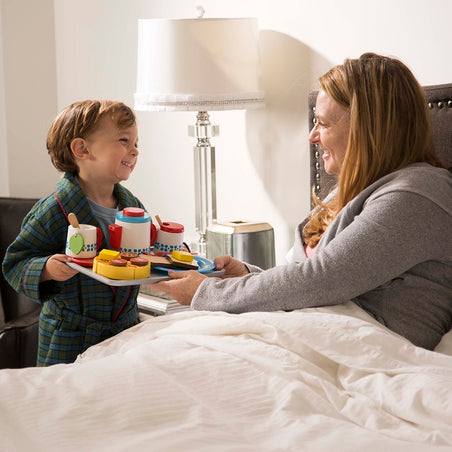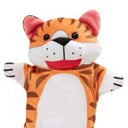The holidays are over and a long winter lies ahead. The increased indoor family time provides opportunities to connect with one another through play — and deepen relationships and important skills.
“When parents and caregivers play with a child, it builds trust and attachment,” said AAP President Lee Savio Beers, MD, FAAP. “Playful interactions with siblings and grown-ups help kids build brain connections, develop their emotional skills, and strengthen their relationships.”
Experts recommend parents strive to be responsive to the play cues served up by kids, building on their interests, but not dictating the action.
Below are easy ways parents can deepen their connection to their kids through different kinds of play, while also building on their learning.

How Pretend Play Can Help You Connect
“Pretending through toy characters (e.g., dolls, animals, and figures) and associated toy objects (e.g., food, utensils, cars, planes, and buildings) can promote the use of words and narratives to imitate, describe, and cope with actual circumstances and feelings.” — The American Academy of Pediatrics, “Selecting Appropriate Toys for Young Children in the Digital Era”
Play Food: Imitating grown-ups and chipping in at home builds a sense of independence and responsibility. Involve kids as you clean, prepare meals, and make shopping lists! In addition to enlisting kids’ help in the actual cooking of meals, consider gathering some of their play food and kitchen-themed toys at the table for them to explore while you’re at the stove. Even empty pasta/cereal boxes or oatmeal and spice containers can be fun. The conversation and just being present with one another while you play (and work!) side-by-side is what’s most important here. Some questions to ask them while they are pretend playing in the kitchen:
- What are you making?
- What will you call your creation?
- How do you think it will taste? Can you describe the flavors to me?
Also, try to get in the habit of narrating your everyday activities (“Now I have to mince the onion into tiny pieces.”) Kids pick up new vocabulary as they hear you use words in context.
Dolls & Stuffed Animals: A great way to check in on your child’s emotional health and well-being is to use dolls, stuffed animals, and puppets. For example, if your child is going to school virtually, suggest during playtime they pretend to send their favorite doll or stuffed animal to school. Listen carefully to their narrative to uncover any underlying concerns or challenges they may be facing in real life. Some questions to ask:
- What does [doll’s name] find hard at school? What’s easy? What’s frustrating?
- Pretend the doll is crying and say: “Hmm . . . I wonder why the doll might be sad?”
- Pretend the doll is laughing and say: “Hmm . . . I wonder why the baby might be laughing?”
How Creative Activities Can Help You Connect
“Adult success in later life can be related to the experience of childhood play that cultivated creativity, problem solving, teamwork, flexibility, and innovations” — The American Academy of Pediatrics, “Selecting Appropriate Toys for Young Children in the Digital Era”

Coloring, Drawing & Crafts: Coloring and art projects can help reduce stress, for parents and children. Work together on a drawing or craft project, taking turns adding elements. This helps build flexibility and collaborative thinking. The outcome isn’t important; it’s about the quality time, the memory-making, and the engaging social interaction. Some points to consider:
- Brainstorming ideas, testing them out, and taking steps to finish a project are skills that will help children throughout their lives. Model brainstorming by pretending to not know what to do next (e.g., what color or material to choose) and saying, “Hmm, I think we’re stuck. What can we try?”
- The pandemic has limited children’s contact with far-flung relatives and friends. Encourage kids to make a drawing to mail to a grandparent or loved one. As they’re drawing, talk about the recipient and some of their favorite things. Wonder aloud how that person might be feeling this time of year. This can help kids practice understanding another person’s point of view and emotions.
How Developmental Toys Can Help You Connect
“In particular, children need to use their hands to explore and manipulate to strengthen those areas in the brain associated with spatial and mathematical learning. Recent investigations have revealed that during children’s play with electronic toys, there were fewer adult words, fewer conversational turns, fewer parental responses, and fewer productions of content-specific words than during play with traditional toys or books.” — The American Academy of Pediatrics, “Selecting Appropriate Toys for Young Children in the Digital Era”
Shape Sorters, Blocks, Cause & Effect Toys: Children learn and grow when they explore the physical world. Their minds learn best when they interact and play with parents, siblings, caregivers, and others. Help build gross and fine motor skills by placing pieces just out of reach and having kids pull them near. Make observations as you play together. Joint attention -- caregivers and kids looking at objects while playing and talking — helps with social thinking and language. As kids play, draw attention to their senses. Ask:
- What colors do you see?
- [Clap two pieces together.] Ooh - listen to that! Can you make that sound?
- Which looks/feels/sounds better to you, this or that?
About the Power of Play
The American Academy of Pediatrics is joining forces with Melissa & Doug to foster early brain development and champion the health benefits of open-ended play. The Power of Play alliance will support parents and caregivers in helping children build important life skills through play, manage screen time, and connect with others on a deeper level. Learn more at MelissaAndDoug.com/PowerOfPlay




